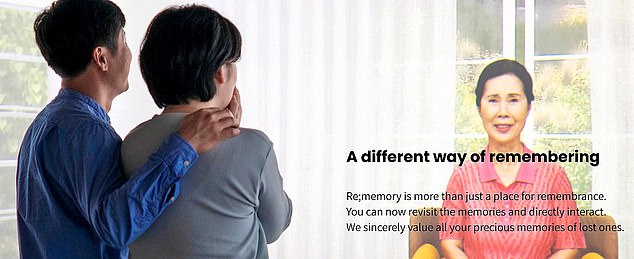Touching – or grotesque? The AI gadget that lets you ‘talk’ to loved ones beyond the grave
>
Touching – or grotesque? The AI gadget that lets you ‘talk’ to loved ones beyond the grave to help friends and family cope with grief
- A Korean artificial intelligence firm has made the ‘ghoulish’ vision a reality
- They insist the controversial service will help friends and family cope with grief
- Expected to cost between £10,000 and £20,000 to create a virtual person
- Software can even answer questions from the grieving and share past memories
<!–
<!–
<!–<!–
<!–
<!–
<!–
It sounds like something out of a dystopian sci-fi film: virtual-reality humans that mimic the voices and facial expressions of dead people, so loved ones can speak to them from beyond the grave.
But now a Korean artificial intelligence firm has made that ‘ghoulish’ vision a reality, insisting the controversial service will help friends and family cope with grief.
The technology uses machine learning to process images, audio recordings and video footage of recently deceased people to create a virtual version that can interact with the living, as if on a video call.
Called re;memory, the software can even answer questions from the grieving, and share memories from the past.

Seoul-based DeepBrain AI showcased the service at the Consumer Electronics Show in Las Vegas. It is expected to cost between £10,000 and £20,000 to create a virtual person, then £1,000 each time a loved one wants a conversation with it.
Business development manager Joseph Murphy acknowledged that the service was controversial. ‘We’ve already found it to be really polarising,’ he told The Mail on Sunday. ‘Some people love the opportunity to live on forever in this way, but many people view it as inauthentic.’
But he added: ‘People like that they can share their memories after they’re gone and they want their family to remember them in a healthy state.’
He suggested re;memory was best suited for people with terminal illnesses such as cancer who could spend several hours in front of a camera to allow the software to learn their mannerisms and collect voice data. Subjects are also encouraged to write journals about their lives, including childhood memories, to be saved into the system.
Family members can then visit the company’s studio to speak to the replica loved one after their death. When prompted, the avatar can recite extracts from their journal or interviews. Murphy says the results are realistic. He said: ‘You might ask it “Tell me about the time you met Dad”, and the virtual person will be able to tell the story in full. The more they journal, the more realistic the experience will be.’
But Sue Gill, a volunteer with Cruse Bereavement Support, said: ‘This sounds bizarre and ghoulish.
‘Lots of people, when they know they are dying, write letters or journals or make recordings. That’s using modern technology at its best. This feels slightly like they are preying on the bereaved.’
The service has been launched in Asia and the US, with plans to open in the UK soon. Last year, another firm, LA-based StoryFile, created a digital version of Marina Smith, 87, which talked to mourners at her own funeral in Nottinghamshire.
